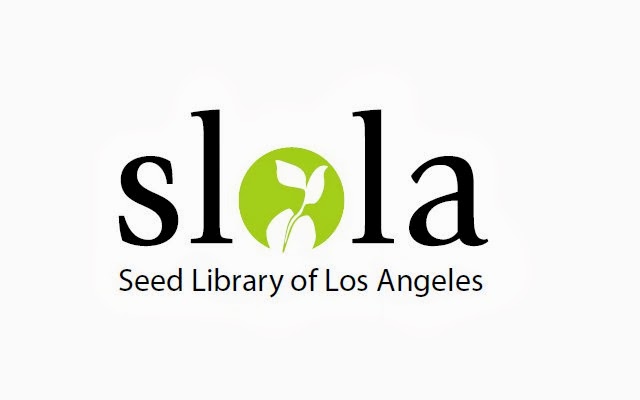This
paper is to address a few discrepancies in the last several months
that are a significant part of the core concepts by which the Seed
Library of Los Angeles was founded. This paper begins to establish a
network for the management of the inventories each library has and
those concepts. The addition of
the Sepulveda Branch brought out several facts that need to be
recalled:
- Never should any hybrids be offered as a part of SLOLA inventory. Hybrids are not likely to bear true and this has several ramifications – specifically, borrowers are given a false sense of our priorities and of the capabilities of hybrid seeds, at minimum, granting permission for them to feel that hybrid seeds are not only condoned, but must be replantable to be saved in the future; and that SLOLA believes hybrids are A-OK. Neither assumption is true. Our founding documents make it very clear that SLOLA does not condone or offer hybrid seeds at any time under any condition. It is better that we not have seeds than have hybrid seeds. This is in no way negotiable.
- SLOLA libraries should have different inventories at all times. The exact proportion of inventories is dependent on the number of members and availability of seeds appropriate to the microclimate served by the branch. The easy way to determine this is to look at a Sunset Western Garden Guide and use the Sunset Zones described in the beginning of the book. More than any other publication on gardening, the Sunset Zones allow a gardener to become intimately connected to the garden conditions in that area.For example, in setting up the Sepulveda Branch, we ascertained that their zones were much more appropriate for melons, cucurbits, large tomatoes, squash and sweet corn than the gardens of Mar Vista and Venice. Hence, the majority of those seeds went to them.
- Inventories should include seeds returned, and seeds should be returned to the library where they were dispensed. This restocks the shelves with seeds already moving towards a variety adapted to those conditions specifically.
We are looking
for “hyper-local” seeds in the end. All branches, for example,
might include Burbank Slicer Tomato, but in several generations seeds
at each branch, differences in growth should begin to be apparent.
Once the seeds have segregated, only in case of a disastrous loss
should the other branches step in to help another branch – unless
there are plenty of extra seeds on hand. Of course, branches may
share seeds for cross-polination experiments, or if one branch has
rare seeds that have been procured locally, those seeds should be
shared with other branches as soon as possible to prevent a
catastrophe at one branch from loosing all the seeds.
This is very
simple. Whatever will work to save seeds and to build hyper local
productivity should be every librarian's goal. As SLOLA matures and
every branch's seed diversify, I remain grateful for the support in
bringing seeds to new communities and reinvesting others with the
spirit of the seeds. All of this encourages us, as seed savers and
seed stewards, towards creating solid educational programs that all
of us can use for the betterment of the communities' seed
independence and seed sovereignty for years to come. Our part in this
is vital.
To prioritize
plainly:
- Save the seed/save the variety; save the name. Using the Ark of Taste as one guideline, we could also reach out into our communities (i.e. community gardens) and find the growers of seeds that are not readily available and commit to save those varieties and not lose the significance of their origins.
- Share the seeds when you have enough to share without fear of losing all your seeds; SLOLA chapters could come together for an Annual Seed Swap among all the branches to meet and greet one another and seed savers from each branch could be recognized for their efforts in saving local varieties of seed.
- Historical seeds from local gardeners and farmers should be shared with other branches as soon as any give branch has sufficient inventory. Each branch is encouraged to find ways of bringing seeds and the stories about them to their branches and disseminate the stories with the seeds as a branch project.
- Germane to the idea of branches saving seeds, we also need to preserve the story about those seeds! Programs might be developed around stories of the seeds, whether they come from local individuals or stories that come to us from other sources. At some time in the future, such stories could be put into book form for further dissemination.
At this time,
(November 2018), SLOLA, recognizing the difficulty of saving certain
seeds would rather all but the most experienced seed savers, simply
check out seeds of the Cabbage family and not attempt to return the
seed. Experience of some of our best seed savers suggest that saving
seed from plants (for example, the cabbage family) is simply
impossible. It would be better to have no seed in stock than to have
seeds that won't come true. An ounce or two of seeds for these plants
should be inexpensive enough and it would be better to have seed that
can be produces true. At some time in the future, we may have the
ability to produce good seed for the Brassicaceae,
but until then, let's just buy the seeds. Corn, because of population
sizes to keep the varieties healthy is another one we should buy
seeds until we can find the land and the volunteers to keep varieties
viable.
David King
Best Practices
Chair
